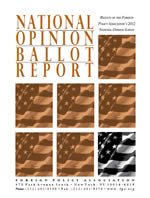Eight in ten surveyed support U.S. Ratification of UN Convention on Law of the Sea

Americans participating in the Great Decisions annual National Opinion Ballot express strong support for UNCLOS and fisheries managment.
By Tyler Benedict
The world's oceans are essential to life on earth, and they are tremendously sensitive to climate change. The international community has a vested interest in protecting the oceans, but cooperation is sometimes complicated by competing claims for natural resources.
The United Nations has taken a lead role in managing the world's oceans. In 1994, it produced the UN Convention on the Law of the Sea (UNCLOS), which defines maritime zones and serves as a "constitution for the sea." To date, 163 countries have joined in the Convention, with the United States being the only major maritime country that has not ratified the convention. According to the Foreign Policy Association's National Opinion Ballot Report, a large majority of respondents (79%) believe that the U.S. should end its holdout and officially ratify UNCLOS. Such a response may reflect a larger trend on the ballot, as 57% of balloters believe that issues such as fisheries management are best handled by the UN instead of local or regional governments.
The respondents' preference for an international approach extends outside the UN framework. As the global community debates how to handle the Arctic, which is now beginning to yield more mineral resources as the polar ice caps continue to melt, NOBR participants indicate that they would favor an international treaty to govern the use of Arctic resources. Ninety-five percent of respondents agree that the U.S. and other countries with sovereignty in the Arctic should develop an agreement "similar to the Antarctic Treaty," which bans mineral mining and reserves the region for peaceful uses such as research and tourism.
As global warming continues to threaten the fragile ecosystems that exist under the sea, NOBR respondents seem to consider the issue as an international problem requiring international solutions. It remains to be seen what dividends such large-scale cooperation might yield, or indeed if such efforts are even possible, but from a foreign policy perspective the U.S. cannot afford to remain aloof.






